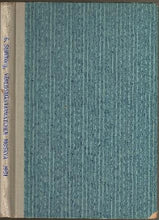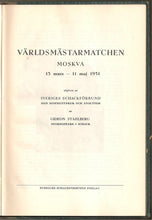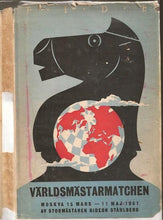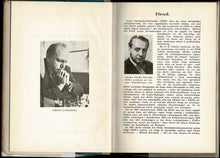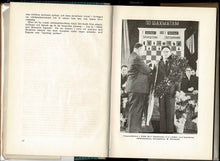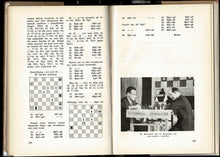
Author: Stahlberg, Anders Gideon Tom (1908-1967)
Year: 1951
Publisher: Sveriges Schackförbunds förlag
Place: Helsingfors
Description:
149 pages with diagrams, photographs and table. Royal octavo (9" x 6 1/4") bound in original publisher quarter beige cloth with blue lettering to spine in original jacket. (Linde-Niemeijeriana: 5168) First edition.
Botvinnik had played no chess in public since he had won the FIDE World Championship Tournament (1948), but he studied thoroughly by annotating every game Bronstein had played since the start of the Saltsjöbaden Interzonal. Beginning in January 1951, Botvinnik also began compiling a notebook filled with his latest ideas in all the openings he thought might figure prominently in the match. Bronstein claimed that Botvinnik hadn't played since 1948 "because he did not want to reveal his opening secrets." Botvinnik finalized his preparation just days before the match with two secret training games against Viacheslav Ragozin. Bronstein also played two training games, against Semyon Abramovich Furman and Paul Keres. Match conditions had been decided at the Paris 1949 FIDE congress. The winner would be the first to score 12 1/2 points from a maximum of 24 games, with the champion enjoying draw odds. The time control was 40 moves in 2 1/2 hours, and 16 moves an hour thereafter, with an adjournment to the following day after five hours of play. According to FIDE rules, the winner would receive $5,000 and the loser $3,000, but Andrew Soltis maintains that Botvinnik and Bronstein actually got considerably less than this. If the champion lost, he had the right to play the new champion and the winner of the next three year candidates cycle in a three player match tournament for the title.
The games were played in Moscow's Tchaikovsky Concert Hall under the direction of arbiter Karel Opocensky and controller Gideon Stahlberg. The seconds were Ragozin and Salomon Flohr for Botvinnik, and Alexander Konstantinopolsky for Bronstein. Bronstein opened the match with the Dutch Defense. Botvinnik considered himself an expert on both sides of the Dutch, and had not prepared for this system. Botvinnik suspected that Bronstein meant to "force me to fight against my 'own' systems," a ploy he dismissed as "naive." After scoring +0 -1 =2 in three attempts with the Dutch, Bronstein abandoned it after game 9. By game 22, Bronstein led by a point and needed only win once more, or draw twice in the last two games, in order to unseat the champion. Botvinnik responded with one of his best games of the match. He describes the final move of the 23rd game, 57. ♗g5: "Zugzwang...Bronstein needed forty minutes to convince himself of the inevitability of defeat." Bronstein could still have become champion by winning the final game, but after pressing with the white pieces for 22 moves, he appeared to be without winning chances and accepted Botvinnik's draw offer. By tying the match score 12-12, Botvinnik retained his title.
Condition:
Front heal corner bumped and rubbed through. Jacket chipped at head edge, spine chipped and lacking 3 inches at middle, chipped at both head and tail, fold over chipped else a very good copy in a good jacket.
SOLD 2025





